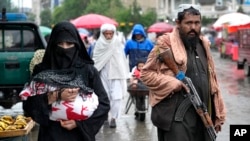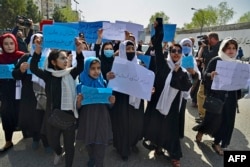Four years after the Taliban retook power in Afghanistan, the United Nations says the ultra-conservative group "is closer than ever to achieving its vision of a society that completely erases women from public life."
Since returning to power on August 15, 2021, Taliban officials have imposed a series of draconian rules that strip Afghan women and girls of their rights and dignity, the gender equality agency UN Women said on August 11.
The Taliban-led government has banned girls from school beyond the sixth grade, while women are barred from most jobs and political life. They also must adhere to a strict Islamic dress code outside their homes.
A new report by the UN Assistance Mission in Afghanistan (UNAMA) backs up the warning issued by UN Women documenting numerous cases of women being detained by inspectors from the Ministry of Promotion of Virtue and Prevention of Vice -- the Taliban's morality police -- for allegedly breaching the dress code requirements.
"The edicts which the Taliban have passed restricting women and girls' rights interact together to create an inescapable cycle which relegates women to private spaces and increases their vulnerability," UN Women said.
The UN says more than 78 percent of Afghan women have lost access to education, employment, or training since the Taliban returned to power.
For example, in the western city of Herat, UNAMA said, dozens of women deemed not in compliance with the hijab rules were barred from entering markets or using public transport in May. Several women were detained until their relatives brought them clothes to cover themselves completely, according to the report.
The Taliban has banned women from traveling without a male guardian, a move that in some instances has deprived women from accessing health-care and other vital services.
According to UNAMA, the Taliban's morality police have instructed health clinics, government offices, shops, markets, and taxi drivers across the country to deny services for women not accompanied by a male relative, or a so-called mahram.
In the Upper Maiwand district of southern Kandahar Province, for example, Taliban inspectors reminded drivers, travel agents, and travelers at the local bus station that women and girls are not allowed to travel without a mahram.
The Kandahar morality police also demanded female health-care workers be accompanied to work by a male guardian carrying a "mahram identification card." Such cards are issued by the Taliban-led Department of Public Health and establish the relationship between the card holder and the female health worker.
Child marriage has also become more common, and "women are increasingly subjected to violence, inside and outside of their homes," the UN said.
UN Women predicts that impediments to receiving health care for women will increase maternal mortality rates in Afghanistan by 50 percent by 2026.
Many of the deaths were reportedly due to preventable pregnancy complications exacerbated by severe shortages in qualified birth attendants and an under-resourced health-care system.
The shortage of specialists is expected to be even more dire in coming years as the Taliban has banned women from studying at universities and has closed private schools that offered courses on midwifery, nursing, and laboratory assistance.
UN Women warned the results of the Taliban's oppressive policies on women in Afghanistan "are devastating."
"Women are living shorter, less healthy lives," the UN agency said.
The situation for women and girls in Afghanistan has become "increasingly untenable" under the Taliban, the agency said, and warned that "without urgent action, this untenable reality will become normalized and women and girls will be fully excluded" from public life.














